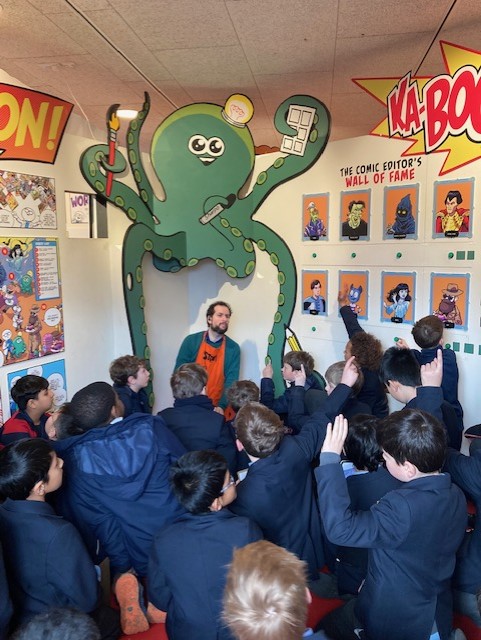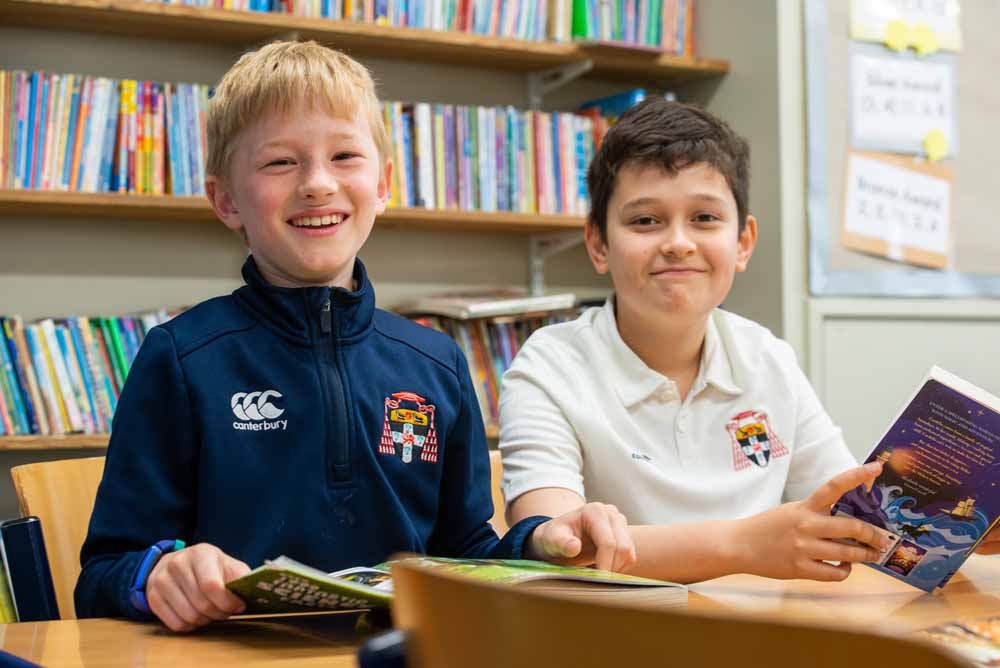ENGLISH
“The more that you read, the more things you will know. The more that you learn, the more places you'll go.”
Dr. Seuss.
Our aim at CCCS is to create a whole school ethos in which the gift of communication through the spoken and written word creates the foundation of happiness and success, not just academically, but in life.
We aim to give our boys the ability to listen with empathy, to speak with confidence, to read with curiosity and to write with passion and belief. We hope that a love of English will stay with them for life, and open new doors and opportunities wherever they find themselves in the world.

The foundation of English as a subject is the ability to communicate in all its forms. It is vital to remember that the foundational skills of language are those of listening and speaking. If we want our pupils to be successful readers and writers, we must first help them develop the ability to listen attentively and analytically, and to speak with confidence and clarity; listening is the best way to acquire language, and speaking the best way to consolidate it and make it one’s own. Throughout their time at CCCS, the boys have many and varied opportunities to listen and to speak, whether in assembly, in lessons or in plays and performances. Within the English curriculum, they take part in a poetry recital competition and a debating competition and are given frequent opportunities to present their ideas verbally in class. By Years 7 & 8 the boys are expected to discuss poetry, Shakespeare, 19th and 20th century literature, and be able to express their thoughts with fluency and precision.
“After nourishment, shelter and companionship, stories are the thing we need most in the world”
Phillip Pullman.
Reading within the English curriculum takes two distinct forms: the functional skill of decoding and understanding language, and the complex skill of comprehension, which can be broken down into elements such as prediction, inference, retelling, summarising, personal response and evaluation. At CCCS the curriculum in Pre-Prep begins with a focus on the functional skills, whilst introducing the boys to simple comprehension skills, such as retelling and prediction. Throughout their time in the Prep School, the boys are encouraged to read, both in the school library, and through their own choices of personal reading at home. Their reading fluency is developed during regular opportunities to read aloud and silently in school, and through discussion and evaluation of that reading in both verbal and written forms. From Year 3 the boys study a class novel each term and this forms the basis for discussion of elements such as character, setting, plot and context. As the boys progress to Year 7 & 8, they read a variety of texts from different time periods and cultures which challenge their comprehension and encourage them to make connections across their reading, so they develop a wide appreciation of genres and types of texts and written English. Christ Church is a school in which reading is valued as a foundational skill for learning, and all staff talk to the boys about their reading and encourage a culture of reading within the school. The library is a key element of this culture, and the boys have the opportunity not only to borrow books, but to take part in the running of the library and the selection of new books, all of which inspires a sense of ownership of their reading.

From Reception, the boys are encouraged to write as a way of recording their thoughts and ideas. They are taught to form letters so that by Year 2 they are writing in a joined cursive script which is fluent and easily legible. As their confidence with writing grows, the boys are shown how to write in a variety of functional ways, such as lists, menus and letters so that by Year 3 they are ready to tackle the more complex forms of speech writing, newspaper articles, diary entries and reports. Likewise, in prose writing, what begins as simple sentences in Reception, becomes story writing by Year 2, and develops by Year 8 into the writing of poetry, short stories, descriptive prose and play scripts. The skills are cumulative, and progression happens through the learning of vocabulary, the use of descriptive techniques, the understanding of form and structure, and the effective use of planning and redrafting, so that by Year 8 the boys can confidently write in a wide variety of forms and have developed their own distinctive voice.
“Speech is power: speech is to persuade, to convert, to compel”
Ralph Waldo Emerson.

The study of English at CCCS allows our boys to leave with the communication skills to grow and succeed in the next stages of their lives. It will have introduced them to many different worlds and ideas and encouraged in them empathy and tolerance for the thinking, cultures and viewpoints of others.
"I like to listen. I have learned a great deal from listening carefully. Most people never listen"
Ernest Hemingway.











